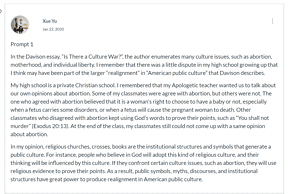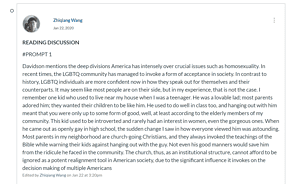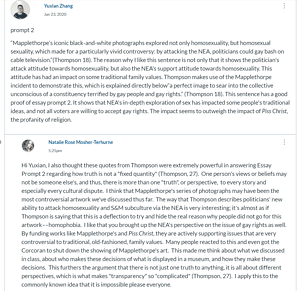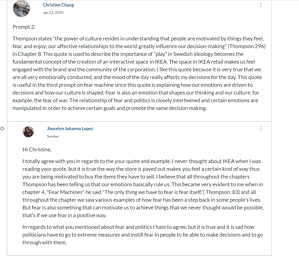Andrew Hartman argues that evangelicals became involved in politics from a sense that American government had become too secular
Directions: For this Forum, you must post an original statement between 150-300 words.
You may 1) respond to a prompt made by the professor below, or 2) respond to a post made previously by a classmate, or 3) come up with your own original topic (so long as it deals with one of the readings assigned for this week). Please make clear by title/author/page number, which part of which text you discuss. Responses to these questions don’t have “right” and “wrong,” provided you make a good faith effort to deal with the readings. In fact, each of the prompts I have composed asks in one way or another for you to link some experience from your own life with something from the readings. So, definitely no right and wrong there. If you prefer to start your own thread here are some suggestions: pick a passage from one of the readings you found particularly insightful or helpful and articulate why you found it so; pick a passage that confused you or that you believed was unclear. PASTE THE PROMPT AT THE TOP OF YOUR REPLY.
PROMPTS FOR THIS BOARD (pick one or supply your own topic)
In the Davison essay “Is There a Culture War?” the author synopsizes the culture war hypothesis in the last full paragraph of p. 13. Were there any episodes, little local disputes, in your local community (or within your family) growing up that you now think may have been part of the larger “realignment” in “American public culture” that he describes? Consider especially public symbols, myths, discourses, and institutional structures.
From any three different chapters in Nato Thompson’s Culture as a Weapon, pick out a single sentence that you think would make an excellent passage to quote in response to at least one of the essay prompts. For each passage you select, a) explain the immediate context in Thompson’s book; b) explain why you like the passage; and, c) explain which essay prompt you think the passage will help illustrate and why. [Be sure to include page numbers with your selections.]
In the chapter “Taking God’s Country Back” from A War for the Soul of America, Andrew Hartman argues that evangelicals became involved in politics from a sense that American government had become too secular. (71) Their involvement in politics was therefore a literal means of taking back the country for their particular sense of morals. Of the issues Hartman subsequently mentions as a sign government/society turning away from religion, which do you think they have had the most success at changing back?


Answer preview to Andrew Hartman argues that evangelicals became involved in politics from a sense that American government had become too secular
APA
411 words




